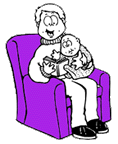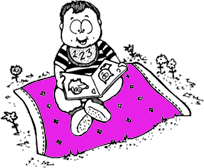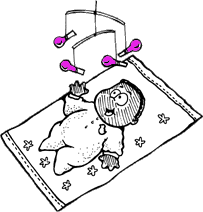|
Activities and Ideas for Babies
Listening and Talking: Young babies make sounds and move their bodies.

- Listen and talk to your baby throughout the day. Get to know the meaning of your baby's cries and gestures. Listen to the sounds the baby makes and watch the way the baby's body moves.
- Take your time while feeding, diapering, and bathing your baby. Sing songs, say nursery rhymes, and smile and coo back at the baby's smiles and coos. In this way your baby will learn that you think what he or she says is important and that people take turns when talking with each other.
How to help your baby's caregiver: Tell your caregiver how your baby communicates with the family. Explain the meaning of your baby's cries, babbles, gestures, and words. Ask the caregiver to tell you how your baby expresses his or her wants and needs. |
Young babies listen to the sounds and voices around them.
- Talk to your baby about what you both are doing and what he or she sees and hears. "I see you looking at your mobile. I'll touch it gently to make the faces move back and forth."
- Tell your baby through your words and actions how much he or she is loved and valued.
- Give your baby simple directions with words and gestures. Point, look toward something, or hold out your hand while talking to the baby. Ask, "Are you hot?" Then, lift up your arms and say, "Please lift up your arms so I can take off your sweater."

Reading
Young babies like being close to their families.
- Many people say you should start reading to your baby at birth. Even though your baby doesn't understand your words, he or she loves to sit on your lap, hear your voice, and have special time with just you. You will feel relaxed and the baby will learn to think of reading as a pleasant activity.
- Let your baby set the pace for your reading times. When the baby loses interest in reading, play a game, or do something else together.
How to help your baby's caregiver: Tell your caregiver about your baby's favorite books and show your caregiver the words to songs and rhymes in your home language, so that your baby can feel secure at home and at child care. |
Young babies use all their senses to learn.
- Babies are likely to crumple, shake, and chew books just as they do with other things. Look for soft cloth or vinyl books that can be washed.
- Choose books with simple, large pictures or designs set against a solid background on each page. Ask your librarian to suggest books for babies, and look for children's books in good condition at yard sales and neighborhood bazaars.
Developing Muscles For Writing
Young babies are learning to use their hands and fingers.

- Help your baby develop hand and finger muscles. Place a simple rattle in your 3-month-old baby's hand. Hold out a sponge for your 5-month-old to grab. Give your 8-month-old a piece of paper to crumple.
- Encourage your baby when he or she tries to do things such as pulling off socks and holding a bottle while sitting in your lap.
- Play with your baby. Shake a rattle then hand it to the baby to have a turn shaking it. Hold out your hand so that the baby can hand the rattle back to you.
How to help your baby's caregiver: Ask your caregiver what toys and materials your baby plays with at child care. Discuss often the new things your baby is learning to do without help at home and at child care. |
Young babies are learning that they can make things happen.
- Watch your baby to see what he or she likes to do. Provide play materials that match the baby's skills and interests. Offer toys the baby can use to make noise, such as plastic keys on a ring to hold and shake, soft toys that squeak when squeezed, a wooden spoon to hold and bang on the floor.
- A cradle gym tied to a crib or playpen will encourage your baby to reach out and try to touch the items and make them move. Remove the cradle gym when the baby gets strong enough to pull it down.
|
|
|